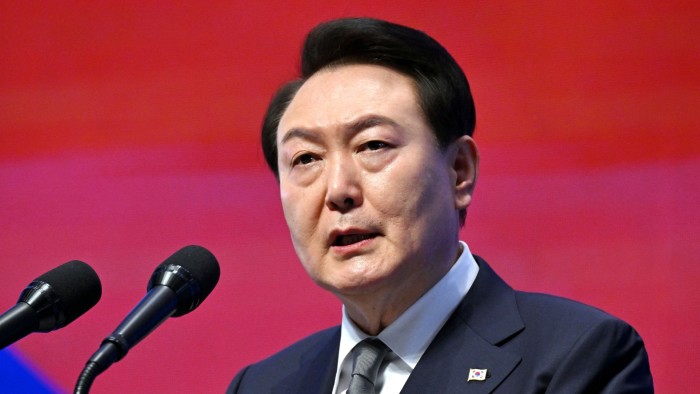Unlock the Editor’s Digest for free
Roula Khalaf, Editor of the FT, selects her favourite stories in this weekly newsletter.
A South Korean court has approved an arrest warrant for President Yoon Suk Yeol, who was impeached by parliament earlier this month over his failed attempt to impose martial law in the east Asian country.
The move on Tuesday marked the first time in South Korea that an arrest warrant has been issued against an incumbent president.
The Seoul Western District Court also issued a search warrant for Yoon’s residence, following a request from the Corruption Investigation Office for High-ranking Officials (CIO), which is investigating the president for treason and abuse of power.
The warrants came after Yoon ignored the agency’s repeated summons for questioning, and marked the latest blow in an escalating political crisis that has raised concerns about the health of democracy in Asia’s fourth-largest economy.
Last week, opposition parties impeached acting president Han Duck-soo after he refused to appoint three justices to fill vacancies on the Constitutional Court, which is deliberating whether to remove Yoon from office.
It remains unclear whether the agency will carry out the warrants, which are valid until Monday. The CIO said it planned to execute the warrants, but there are concerns that the presidential security service may block the agency from detaining Yoon or searching his office under a law that bans searches of sites with state secrets without approval.
Following Yoon’s impeachment on December 14, police had attempted to raid the presidential office, but were blocked from doing so. The presidential security service said on Tuesday that security measures would be taken for the president according to the legal process.
Yoon’s lawyers said the arrest warrant was “surprising and hard to accept”. They added that the court’s move was “illegal and invalid”, arguing that the CIO did not have the power to investigate high-ranking officials for treason.
Under South Korea’s constitution, the president has the privilege of immunity from criminal prosecution, but it does not extend to allegations of rebellion or treason.
Yoon has denied wrongdoing and vowed to “never give up” in the face of the allegations against him. He is facing a criminal investigation into possible insurrection after he allegedly dispatched troops to the national assembly in an attempt to prevent lawmakers from rejecting his martial law decree.
Kweon Seong-dong, the acting leader of Yoon’s ruling People Power party, said on Tuesday that detaining a sitting president was inappropriate, according to state-run Yonhap News.
The main opposition Democratic party called for Yoon to be detained immediately.
Yoon has been suspended from his duties until the Constitutional Court makes a decision on whether to dismiss or reinstate him. Finance minister Choi Sang-mok took up presidential powers on an interim basis following Han’s impeachment.
The court is supposed to reach a verdict by June, although that deadline limit is not binding. If Yoon is removed from office, a presidential election must be held within 60 days.
Read the full article here





